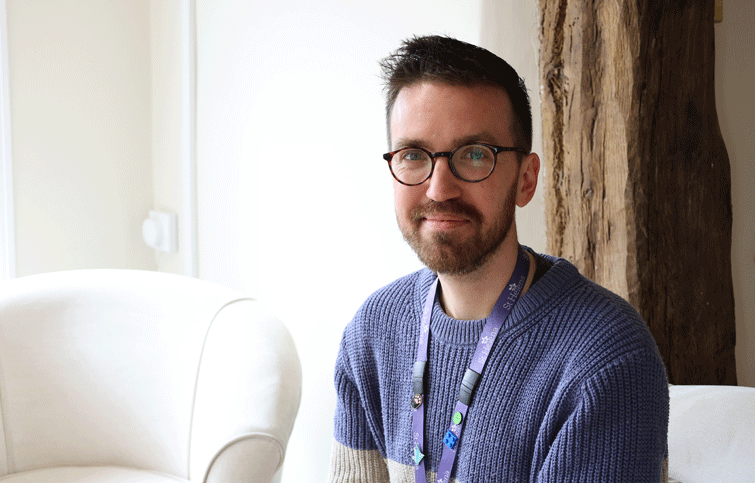Make a difference
People like you help us every day through regular donations
Read stories DonateAs I prepare to go and visit my family this Easter weekend, I’m looking forward to spending some time with my niece (4) and nephew (not even 1). They’ve been hanging out with my parents this week, preparing for Easter by colouring eggs, sticking stickers, and hanging decorations. It feels a long time ago since I did those kinds of things with my parents, and it’s made me feel nostalgic about the little unspoken family traditions which we used to hold. When I was a similar age to my niece now, my sister and I used to start our weekends by crawling between our parents in their bed.
My dad (maybe partly to escape) would roll out of bed to put the kettle on. He’d make coffee for my mum and himself, and warm milk with honey for my sister and me. We lived in France at the time, where house windows had big wooden shutters, so even if it was light outside, it was still dark inside. So when he came back from the kitchen, he’d tell us to close our eyes before hitting the light switch. That way the sudden bright light wouldn’t hurt our eyes – we could adjust to it at our own pace.
When we’ve got used to darkness, bright light can hurt.
The darkness of my parents’ bedroom in the morning felt safe. I knew my parents were there, that they loved me, and that soon I’d be enjoying a nice warm drink with them. I moved out of the comfort and safety of the family home 20 years ago, and like everyone else, have experienced different kinds of darknesses since then, which didn’t feel comfortable, or safe. Those kinds of darknesses can catch us off-guard, and leave us reeling: an illness, a bereavement, guilt from the past, fear from the future… These moments of darkness can feel all-consuming and never-ending. It can feel like hope is lost.
Often, well-meaning friends and loved ones will respond by trying to switch the lights on: encouraging us to look for silver linings, reminding us that we have so much to be grateful for, sharing posts on social media which are supposed to inspire and uplift…
But when we’ve got used to darkness, bright light can hurt.
Sometimes happiness and positivity aren’t good enough. The silver lining can be a reminder of how big the cloud is. The reminder of things to be grateful for can make us feel guilty for not feeling happier. The inspirational quote on Instagram can feel twee and unrealistic. Sometimes what we need instead is to honour the sadness, the anger, the fear, the guilt, the darkness. We need to be reminded that it’s ok to not feel ok, and to be allowed to sit in our not-ok-ness without anyone trying to reduce it or fix it.
We are currently in a calendar period which is held as sacred by many of the world’s big religions. Members of the Muslim faith are fasting for the month of Ramadan. Jewish people are celebrating Passover. Christians have just gone through Holy Week, culminating with Good Friday and Easter Sunday. What unites all these religious seasons is that they allow space for darkness. Christians sit with the discomfort of the crucifixion and the death of Jesus for two days before celebrating Easter. Jewish people commemorate the suffering of their ancestors with bitter herbs and salt water. Muslims go hungry from sunrise to sunset so as to refocus their priorities away from worldly pleasure.
These ancient religions understand that discovering light doesn’t mean pretending the darkness doesn’t exist. In fact, sometimes it’s better to let our eyes adjust to the darkness than to switch on a light. We might just discover that there’s more light in the darkness than we realised. We might even discover that that light has an unexpected source: that it comes from somewhere deep within ourselves.
And if it starts to feel like too much, we can always take inspiration from my dad, and get up to put the kettle on. A local Orthodox Saint, St Sophrony of Essex (who lived in Maldon) has this to offer: “Stand on the edge of the abyss and when you feel that it is beyond your strength, break off and have a cup of tea.”
I’d add a chocolate egg too.

When you make a donation to St Helena Hospice, we are charged transactional fees by other companies, including fees for processing payments made to us, looking up addresses and validating bank account details.
We are very grateful to our donors who offer to offset some of these fees with a minor addition to their total amount. This is however completely optional and we are very grateful for your support whether or not you choose to contribute to processing fees.
CloseWe are able to claim an extra 25p on every £1 on your donation amount for no extra cost to you, as long as you are a UK tax payer; have paid enough income tax or capital gains tax in that tax year; and are donating your own money. If you pay less income tax and/or capital gains tax than the amount of Gift Aid claimed on all of your donations in that tax year it is your responsibility to pay any difference. For more information about Gift Aid, please visit https://www.gov.uk/donating-to-charity/gift-aid
